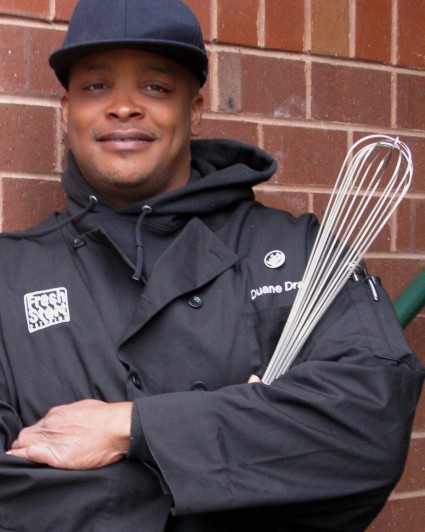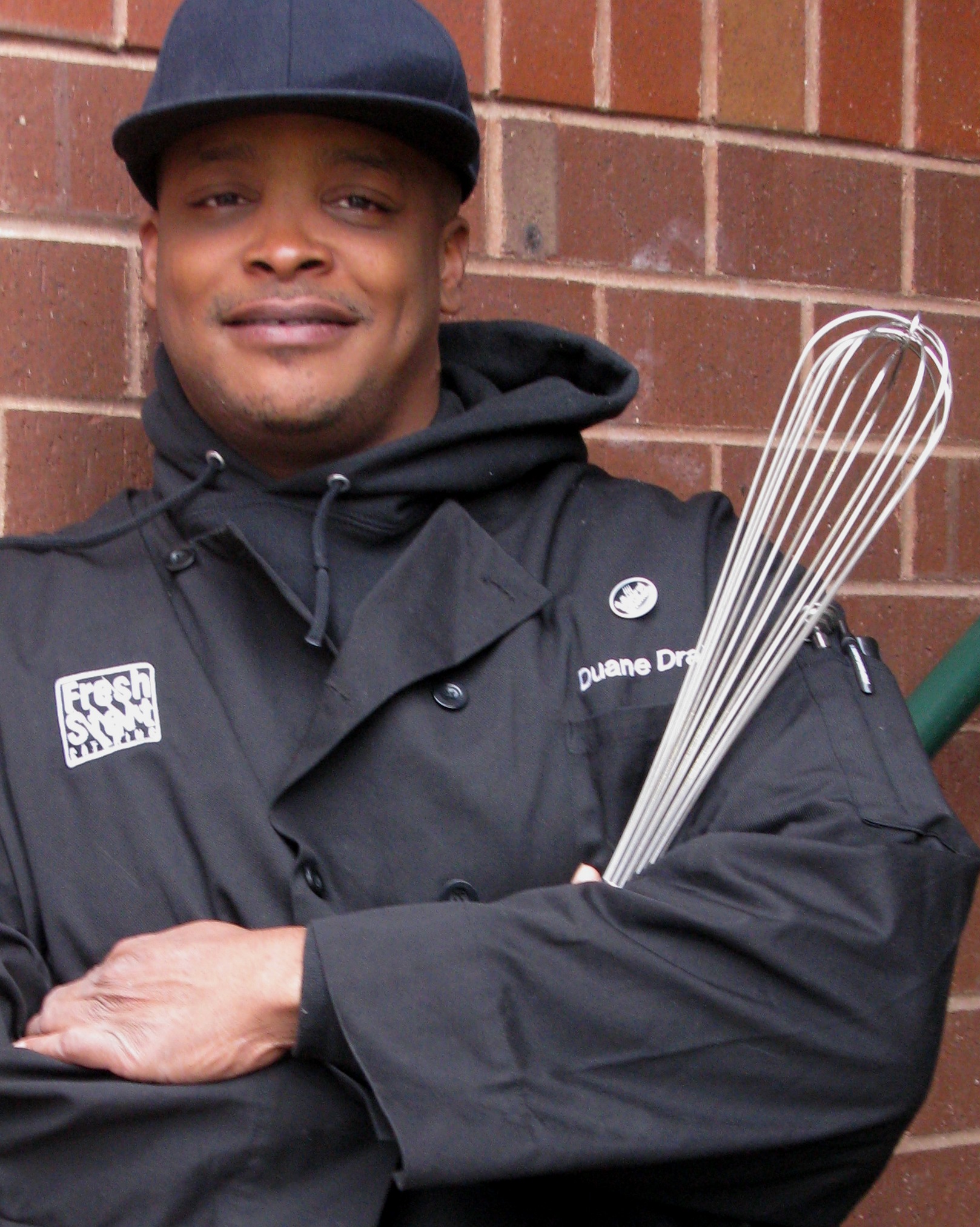This is the first of three articles on how food made from scratch using local ingredients is served to the students and staff at Washington Jesuit Academy, a free-tuition private school for at-risk kids.
 Duane Drake, head chef at Washington Jesuit Academy. Chef Duane Drake lines a dozen pie shells on sheet pans and begins filling them for breakfast quiche. First, he scatters freshly torn spinach leaves at the bottom of the shells. Then he begins cutting blocks of Muenster cheese into cubes. He works quickly. “This morning, I’m speedballing,” he explains. Two of his assistants have been out sick. He’s behind with the prep work.
Duane Drake, head chef at Washington Jesuit Academy. Chef Duane Drake lines a dozen pie shells on sheet pans and begins filling them for breakfast quiche. First, he scatters freshly torn spinach leaves at the bottom of the shells. Then he begins cutting blocks of Muenster cheese into cubes. He works quickly. “This morning, I’m speedballing,” he explains. Two of his assistants have been out sick. He’s behind with the prep work.
In the walk-in refrigerator, Drake locates a large plastic tub filled with an egg, milk and pesto mixture he made the night before. He begins pouring it into the pie shells and checks the clock: He has only a few minutes to get the quiches into the kitchen’s convection oven and finish baking them before students arrive at 7:30 for breakfast at Washington Jesuit Academy.
Wait a second. Can that be right? Handmade quiche for school breakfast?
Yes, you heard correctly. At this all-boys middle school in Northeast Washington, D.C., all of the meals are made from scratch every day. Not only are the ingredients fresh, most of them are locally grown as well. The eggs and milk, for instance, are from Trickling Springs Creamery in Chambersburg, Pennsylvania. The basil and other micro-greens on the menu hail from southern New Jersey. The Muenster cheese is made by Amish Delight in Louisville, Ohio.
When the quiche goes into the oven, Drake will start on lunch: a pasta sauce made with roasted local chicken, hot house plum tomatoes from farms in Virginia’s Shenandoah Valley, eggplant and other vegetables from a produce auction in Dayton, Virginia. It’s all the brainchild of D.C. Central Kitchen, a social service agency perhaps best known for providing daily meals to thousands of the District of Columbia’s homeless and needy, but now flexing its know-how and local food connections through its own for-profit catering company, Fresh Start, which runs the kitchen at Washington Jesuit Academy. Drake and his crew also are responsible for feeding children and staff at a nearby child-care center, as well as some 18 students in a post-high school training program across town and other catering jobs that come in over the transom. A fleet of D.C. Central Kitchen trucks keeps the food moving.
Washington Jesuit Academy is a “tuition-free middle school offering quality education to disadvantaged boys in the 6th, 7th & 8th grades,” according to its website. The students, Drake’s clients, are 71 “at risk” boys who spend 12 hours each day in the school’s intensive educational program and eat breakfast, lunch and dinner at school. They love the quiche, served on the food line only minutes after it comes out of the oven, warm and fragrant. “It’s very cheesy,” comments one smiling 12-year-old between forkfulls.
After I wrote a series of articles about the woeful state of cafeteria food at my daughter’s elementary school here in the District–most of it highly processed meal components cooked in distant factories and shipped frozen to D.C. schools–I received a number of tips about schools that were taking a different approach, trying to serve students meals more resembling real food and not junk. I decided to see for myself how a stronger commitment to school food–from individual kitchen workers, food companies and school administrators–could result in better food on children’s plates, and how much that might cost.
All the best ingredients in the world won’t fix school food if there aren’t skilled and committed cooks in the kitchen. At Washington Jesuit Academy, I learned that D.C. Central Kitchen’s social activism has left a definite imprint on personnel. Duane Drake and two of the assistant cooks I met there last week are all ex-offenders who completed a 13-week culinary training course at D.C. Central after their release from prison.
Drake, for instance, spent his last seven-year hitch in the joint on a charge of “assault with intent to maim” after he used the “boot” off a car steering wheel to attack a marine who’d been “messing” with his girlfriend. Eraleigh Green, who was tossing hard-boiled eggs with green onions and pickle relish for egg salad sandwiches when I met him, spent five years in prison for heroin distribution. And Derek Nelson, who usually arrives later in the day, scrubs pots and manages the dinner services, is a former drug addict convicted of selling crack cocaine.
The fourth member of the crew who was out sick, Makeisha Day, enrolled in the D.C. Central training program after she lost her job and was evicted from her apartment.
Commanding the kitchen–devising menus, ordering ingredients–is Drake, who manages meal service with a constant wariness and fretting over details. “I guess you’d call me a worry-wart,” says Drake. Eraleigh Green, who works under Drake, but still acts as a kind of mentor to the younger chef, has a different take on his boss: “He’s a workaholic.”
Or perhaps Drake is still trying to measure up to his father, a career military officer–first Army, then Marines. “I was a ‘B’ student,” says Drake, “but my dad wanted me to get straight ‘A’s.” His father also frowned on Drake’s eating habits.
After his parents split, Drake divided time between his mother on the Outer Banks of North Carolina and his father and step-mother here in D.C. Drake always hated vegetables–still does–and managed to get fat on his mother’s cooking. “I was an obese kid,” he says. His stepmother, meanwhile, could never cook, he says. “She served us chicken that was still red inside.” So he and his brother would smuggle McDonald’s meals into their bedroom in the basement and stash it behind the ceiling tiles. “We’d live for days off that, as long as we didn’t get caught.”
Drake worked odd jobs in restaurants from an early age and learned cooking and especially baking in prison. During his last prison term, he landed a plum assignment as head baker and a frequent banquet chef. He worked overtime to shorten his sentence. He also earned an associate degree in business, he said. But when he moved to Washington, McDonald’s wouldn’t hire him. “They said I was overqualified.” That’s when he enrolled at D.C. Central Kitchen.
Drake still can’t seem to work enough hours. Sometimes he leaves his apartment before dawn, before the buses start running, and walks three and half miles to work. “I’m so tired when I get home at night, I don’t even watch TV.” Last September, Drake collapsed in his office from exhaustion and anxiety and was rushed to nearby Providence Hospital. But the next morning, after being dosed with morphine, he crawled out of his hospital bed and snuck back to work, still wearing his hospital gown and with a trash bag wrapped around the catheter in his arm. He was determined to continue working–until police showed up at school to take him back to the hospital.
“I don’t ever want to be without a job again,” Drake explained. “I don’t want to be homeless, or on the streets.”
He makes wonderful soups: a thick chowder with corn harvested last summer in Virginia and frozen at the D.C. Central Kitchen facilities, cooked with milk, butter and cream from Trickling Springs. He makes a fish soup with fresh salmon and tilapia. The fish comes from a local distributor–ProFish. Occasionally, the Academy’s student “social club,” which sometimes helps in the kitchen and raises money for the homeless with bake sales, convenes for cooking lessons. One day the lesson was given by a ProFish employee who showed them how to “fabricate”–or break down–a whole salmon. “I like to buy salmon with the head on,” said Drake.
He loves ordering specialty produce from local vendors. “I spent $500 for collard greens and tomatoes one time. It was so beautiful; I took pictures of it with my cell phone and sent them to my boss. She was, like, ‘What did you buy?’ “
But Drake knows that kids don’t necessarily like vegetables, especially vegetables they aren’t familiar with. He encourages me to taste the spaghetti sauce he’s cooking in the kitchen’s big, free-standing kettle. “Can you taste the eggplant in there?” No, I say, I didn’t notice. “That’s how I get them to eat certain vegetables. I disguise it.”
Some things the boys just won’t eat at all. “We’ve tried turnips many different ways. Then somebody told them it was turnip. If they know what it is, they won’t eat it.” One day Drake served venison lasagna. The kids, he said, loved it. “But later, when they found out what it was, they said, ‘You fed us Bambi! You’re cruel.’ “
Even though he doesn’t care for vegetables himself, Drake says he encourages the boys to eat a variety of them, even to the point of eating a bowl of black-eyed peas himself after losing a Super Bowl bet with the students. Drake picked the Indianapolis Colts. “We cooked a kettle of black-eyed peas. I ate a bowl and it killed me.”
After his breakdown last year, Drake cemented his reputation with Fresh Start Catering as a kitchen warrior by cooking an entire Thanksgiving feast for the school, its sponsors and parents by himself: 28 turkeys with cornbread and cranberry stuffing, 200 pounds of mashed potatoes, 150 pounds of string beans, snow peas and roasted cherry tomatoes, 98 pies (sweet potato, pumpkin, apple) and dinner rolls. In fact, the morning I met him, he apologized for the pie crusts he was using for the quiche. “They’re from Sysco,” he lamented. “I usually make them myself.”
He always answers questions, “Yes, sir!” and “No, sir!”
“The guys in the kitchen actually take pride in what they do, which makes a difference,” said instructor John Scheibel, who teaches reading and social studies.
“The boys look up to (Duane) and love to help in any way they can,” said the school’s headmaster, Joseph Powers. “Duane helps them prepare meals that go out into the community. He has taught them many kitchen skills, but most importantly, he has been a role model for them.”
Drake seems to delight in exchanging banter with the boys. I watch him as he stands at the food line, enforcing the school’s “No Seconds” rule, put in place to control portion sizes. The boys are not supposed to stuff themselves. But they are allowed unlimited fruit and salad.
“Didn’t I see you here earlier?” he says to one of the boys who seems to be late getting his dinner.
“Unh-unh,” replies the boy. “This is my first time.”
“I could swear you were here earlier,” Drake presses.
“No, sir! This is the first time, I swear!” the boy insists.
“One of these kids asked me why would I work so hard here and not make much money,” said Drake. “It’s about more than that. These boys are my brothers. I tell them, with the education you’re getting here, you can do anything.”
Drake goes back to his office, looks into his computer and starts worrying again. Two new catering jobs from Fresh Start that he’ll be responsible for have popped onto his screen. He’s still short one cook. “This is going to be tight,” he says, shaking his head. “This is going to be very tight.”
Tomorrow: Lunch, and how a catering company’s commitment to better school food results in an exquisite salad bar


